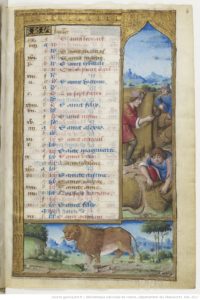
“July”, kalendar page from Les Petites Heures d’Anne de Bretagne (The Little Hours of Queen Anne of Bretagne), by the Maître des Triomphes de Pétrarque. From Bibliothèque nationale de France, Paris (France).
In 1785, Wilberforce came into contact with evangelicalism again, this time through John Newton, a leading evangelical Anglican clergyman. Bu this time Wilberforce was involved in politics—he was MP for Yorkshire—and he wondered if he should persist in such a career. He was encouraged
to remain in politics by Newton and by his close friend William Pitt the Younger (later Prime Minister of England). He did so, but converted, nevertheless. This was a rather bold move for the time, as religious enthusiasm was regarded as a social transgression and was stigmatized in polite society. Even among the upper classes, evangelicals were subject to contempt and ridicule.
For the remainder of his career, Wilberforce’s evangelical zeal informed all his actions. As part of his support for evangelical Anglicanism, Wilberforce was a founding member of the Church Missionary Society (later renamed the Church Mission Society). He also worked to counter what he perceived as the degeneracy of British society. To achieve this goal of moral reform, he founded the Society for the Suppression of Vice. But perhaps the pinnacle of his evangelical politics was his campaign to abolish slavery. Wilberforce was critical in the introduction of the Bill for the Abolition of Slavery, which was passed by the House of Lords just a month after Wilberforce’s death.
July 29 is the date of Wilberforce’s death, but he is commemorated on July 30 to avoid a conflict with Mary and Martha of Bethany. In some jurisdictions he shares a commemoration with anti-slavery campaigners such as Olaudah Equiano (1796) and Thomas Clarkson (1864).


